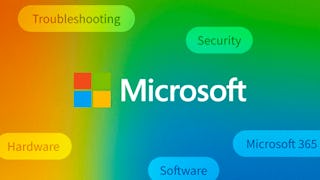![[Featured Image] A student meets with a professor in a classroom to ask how to learn information technology skills like data analytics and visualization.](https://images.ctfassets.net/wp1lcwdav1p1/6zxg6UuOFWvWmyEQ0C6Rwo/a21ee5a86b0307d29e966579c0213334/GettyImages-1681107895.jpg?w=330&h=216&q=60&fit=fill&f=faces&fm=jpg&fl=progressive)
How to Learn Information Technology
Find out how to learn information technology by exploring IT skills and discovering where to get them.
February 5, 2025
Article
Discover the possibilities of a career in IT by exploring the skills and certifications needed for exciting roles in IT support, cybersecurity, cloud computing, and more.

Explore popular IT courses

Skills you'll gain: Information Technology, Computer Hardware, Cloud Computing, Network Troubleshooting, Software Installation, Technical Support and Services, Cybersecurity, Cloud Infrastructure, Hardware Troubleshooting, Data Storage, Database Software, Operating Systems, Computer Networking, Computer Security Awareness Training, Computer Programming, Virtual Private Networks (VPN), Project Management
Beginner · Course · 1 - 3 Months

Microsoft
Skills you'll gain: Microsoft 365, Network Security, Business Software, Computer Hardware, Cybersecurity, Microsoft Office, Desktop Support, Virtual Private Networks (VPN), Network Troubleshooting, Technical Support and Services, Technical Support, Hardware Troubleshooting, Generative AI, Operating Systems, Collaborative Software, System Support, Network Protocols, TCP/IP, Application Security, Cloud Computing
Beginner · Professional Certificate · 3 - 6 Months

Skills you'll gain: IT Security Architecture, Computer Networking, Operating System Administration, Package and Software Management, Network Troubleshooting, Version Control, IT Automation, Systems Administration, IT Infrastructure, TCP/IP, Git (Version Control System), Chef (Configuration Management Tool), Network Security, Ruby (Programming Language), File Systems, Microsoft Windows, Computer Hardware, Technical Support, Interviewing Skills, Applicant Tracking Systems
Build toward a degree
Beginner · Professional Certificate · 3 - 6 Months
In today's rapidly evolving technological landscape, IT professionals with specialized skills are highly sought after across many industries. A career in IT provides the opportunity to harness your technical expertise to drive innovation and streamline business processes. Delve into the diverse career paths, critical skills, and various roles within the IT field to embark on a fulfilling and impactful career that shapes the future of technology.
Interested in IT support? Find out more about what an IT support specialist does and popular IT certifications.
Interested in network administration? Read about typical network administrator roles and responsibilities, and explore certifications in networking.
Interested in cloud computing? Dive into a cloud architect's daily work and popular cloud certifications in the field.
Ready to start learning? Explore our catalog of IT support, network, and cloud computing courses for beginners and experienced professionals.
Typically, an IT certification refers to a qualification you receive that shows your competency in a specific field of information technology (IT). To get a certification, you generally must pass an exam that tests your capabilities and skills in the field.
IT courses on Coursera are structured to accommodate learners at various levels:
The skills, practices, and technologies you’ll use as a cybersecurity professional will continue to evolve along with computer and network technology. The desire to learn, ability to problem solve, and attention to detail will serve you well in this field. Other, more technical skills and technologies to learn include: